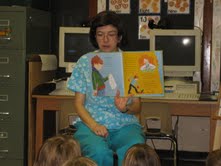
Mrs. Shape said that she had wanted to be an elementary education teacher since she was in the third grade. Even after raising her children and a full career in secretarial work, she never gave up on her dream. After retirement, she went to work as a substitute teacherís aide while working toward her teacherís license.
Because she had a Bachelor of Arts in General Arts and Sciences from Penn State, she entered in the Curriculum and Instruction licensure program at Penn State, which included taking classes and student teaching. To obtain her teaching license, she also had to pass three Praxis tests. The Praxis Series is a set of tests required for prospective educations professionals, such as teachers and school psychologists, as part of the certification process required by many states.
Once Mrs. Sharpe obtained her teaching license, she began working in local school districts as a substitute teacher. Substitute teaching requirements vary by state. In Pennsylvania, substitute teachers are required to have a teaching license.
After attaining her lifetime dream of becoming a licensed teacher, she decided to continue her education and pursue her masterís degree. She entered an accelerated masterís degree program; she will earn 44 graduate-level credits over 15 months.
Mrs. Shapeís has a full schedule. Graduate students in semester-based programs are considered full-time students if they are taking nine credits during a semester. Mrs. Shapeís program requires her to take 15-18 credits during both the fall and spring semesters and 5-6 credits during the summer sessions. In addition to taking classes, Mrs. Sharpe continues to work as a substitute teacher.
After completing her masterís degree and other requirements, Mrs. Sharpe will be licensed to teach special education to students from preschool through the twelfth grade. Because she completed student teaching during her undergraduate education, she is not required to complete additional student teaching. However, she must complete several shorter field experiences. She must also pass the Praxis test for special education.
Education, especially graduate degrees, can be very expensive. Financial aid other than loans for graduate programs can be difficult to find. As a retired Penn State employee, Mrs. Sharpe receives a 75% tuition discount. She also received a federal grant that pays the remaining 25% of her tuition and books. The grant requires her to work in Early Intervention or Early Childhood Special Education for three years following her program completion.
Mrs. Sharpe offers advice for future teachers:
- Make sure you really enjoy spending time with children
- Be prepared to do a lot of paperwork as a teacher
- Use creativity
- Get lots of sleep and eat healthy foods; you will need all of the energy you can get
- Only become a teacher if you want to make a difference in the lives of children
Mrs. Sharpe also offers advice for prospective graduate students:
- Select a program that suits your needs
- Be prepared to work hard
- Stay organized and stick to a schedule
- Keep up with your writing skills
- Look into all possible funding possibilities
Teaching can be a very demanding profession. It requires a lot of time, education, and effort. However, the rewards are great. Teachers prepare shape young minds and prepare students for their future. Having good teachers is also essential to having maintaining a strong society.
Image provided by Cheryl Sharpe. All rights to the image are retained by her.


